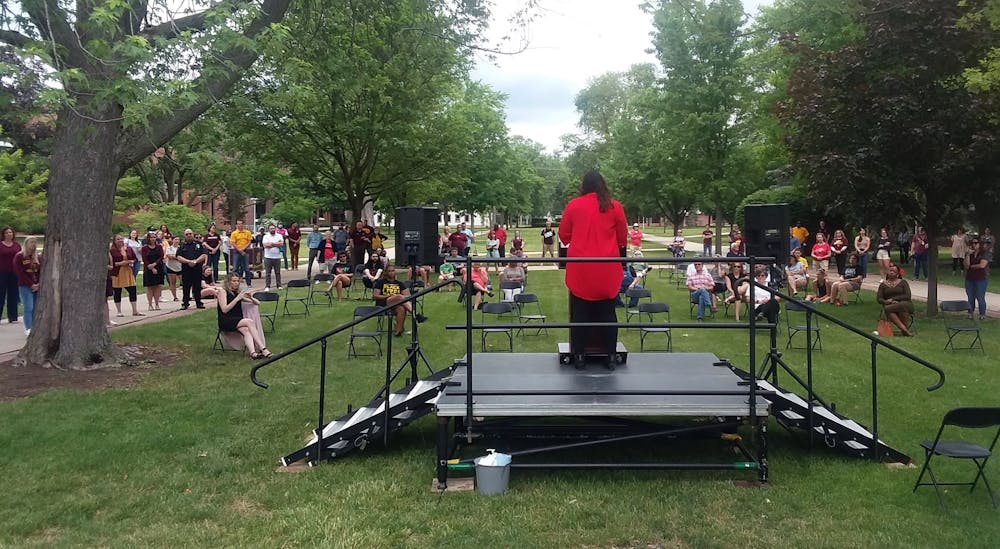CMU hosts historic first celebration of Juneteenth after holiday is federally recognized

Shawna Patterson-Stevens, vice president for inclusive excellence and belonging at Central Michigan University, speaks to a crowd of more 100 attendees in this June 18, 2021, file photo. It was the first Juneteenth commemoration after President Joe Biden declared Juneteenth -- the commemoration of the official end of legalized slavery in the U.S. -- a national holiday. (CM Life photo | Patrick Bouman | file)
After months of planning Central Michigan University’s first ever Juneteenth celebration, the team behind it learned, along with the nation, that President Joe Biden had signed a bill officially recognizing Juneteenth as a federal holiday.
The celebration, which took place from 2-3 p.m. in front of Warriner Hall, featured four speakers who spoke on the significance of the historical event. Among the speakers was Mount Pleasant Mayor Will Joseph, who proclaimed Juneteenth as a day of celebration in the city. After the speakers finished, campus dining provided ice cream.
Stan Shingles, the Interim Chief Diversity Officer, moderated the event and introduced each speaker.
“As we celebrate today and tomorrow, let's remember this is not a done deal, but certainly a work in progress,” Shingles said. “We celebrate the beginning of the end of our nation's great original sin: the institution of slavery.”
Shingles said the name of Juneteenth comes from June 19, 1865, when slaves in Texas learned of the Emancipation Proclamation made almost three years prior. The historic date has been celebrated by African American communities for almost 150 years since.
Senior Elashia Jackson spoke about her personal experiences with Juneteenth and said the holiday suffers from “gatekeeping” by educational institutions and she had not heard of the historic day until high school.
“I think we have to make sure we're sharing this information with other people, especially younger kids, so they know exactly what’s going on when it comes to history,” Jackson said. “A lot of information about history is not put on display as it should be.”
Director of Diversity Education Nikita Murry said the event exceeded its goal of 100 attendees, giving another pleasant surprise to the team.
“This is the first day that Juneteenth is observed nationwide as a federal holiday,” Murry said, “as it was proclaimed a day of celebration by our city mayor, and it took place right here on the campus of Central Michigan University, so what that means is we're making history ya’ll.”
Shawna Patterson-Stevens, CMU’s new Vice President and Chief Diversity Officer gave a land acknowledgment to the Saginaw Chippewa tribe before speaking about the holiday.
“I begin today's events with this acknowledgement to underscore the root in ways that colonization has impaired our cultural notions of racialized existences,” Patterson said. “We therefore ask you to take a moment to recognize the growth and development of this country, which was made possible by enslaved Africans who were forcibly brought to this land. We must contend with the violence and trauma they experienced in order for this country, and for us to assemble here today.”
Marceil Davis, an academic advisor and alumnus at CMU, was in the audience for the celebration along with his children. Davis has celebrated the historic day since his childhood and attends Juneteenth events in Lansing each year.
“Usually all the students are gone that may be interested in stuff like this,” Davis said. “Because it’s growing more in saliency in the news and in the media, more people who may not know the history have it on their radar. It’s gaining ground in the community and on campus.”
Norma Bailey, an emeritus professor of education and professional development, said she was attending the event as an “interested citizen.” Bailey said events like this one are important because they raise awareness, especially now that Juneteenth is a federally recognized holiday.
“I see people standing around talking, being socially distant, but engaging with each other, and that's what this is about,” Murry said. “This is like our collective holiday. This isn't a black holiday, it's everybody's holiday.”



